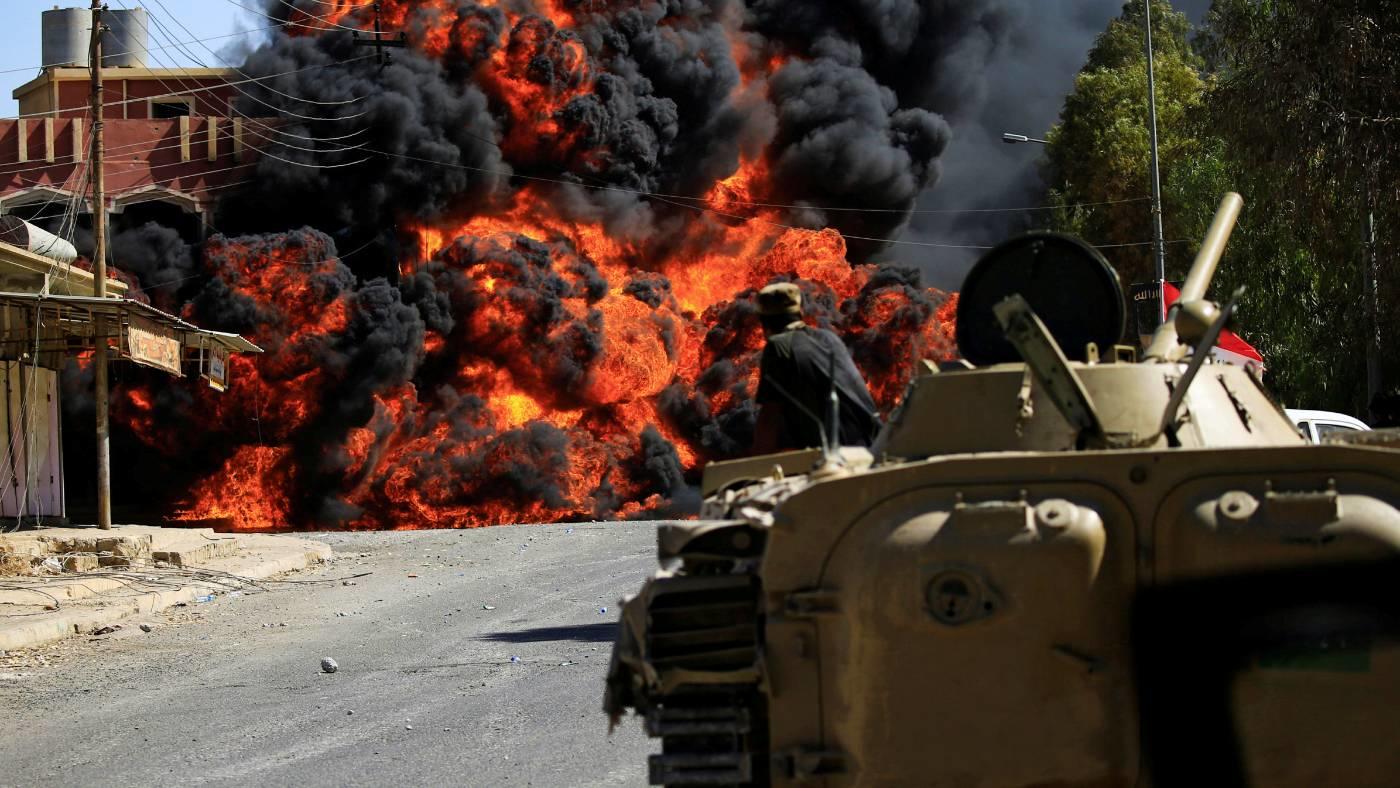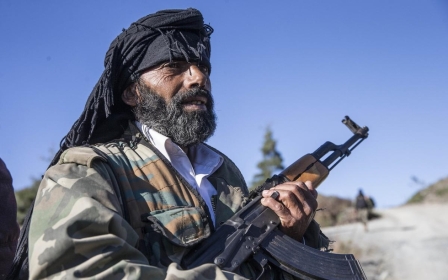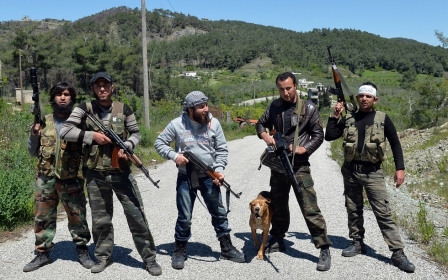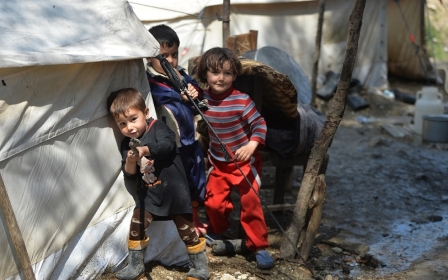The untold tragedy of Iraq's Shia Turkmen women, abducted by Islamic State
The efforts to free Yazidi women and children abducted by the Islamic State (IS) group have brought worldwide support and attention, and won one of their number the Nobel Peace Prize.
Yet hundreds of Shia Turkmen women also kidnapped in the 2014 IS rampage have been denied the opportunity for freedom, accountability and closure due to the silence and denial of their community's leaders, according to Iraqi officials, activists and international human rights organisations.
The militants' bloody and brutal assault on northwest Iraq in August 2014 is often referred to as the Yazidi genocide, with an estimated 3,000 Yazidis murdered and perhaps another 7,000 abducted.
But barely recognised amid those crimes are the hundreds of Turkmen women who were also taken into captivity.
Most are Shia from the Turkmen-dominated rural town of Tal Afar, 80 km west of Mosul. They were seized from the neighbouring Yazidi-majority town of Sinjar, where they and their families sought refuge after IS had taken control of Tal Afar itself several weeks earlier.
New MEE newsletter: Jerusalem Dispatch
Sign up to get the latest insights and analysis on Israel-Palestine, alongside Turkey Unpacked and other MEE newsletters
The vast majority of those taken are not even registered as missing, officials and activists told Middle East Eye. And no real official or non-governmental efforts have been made to locate them and bring them home, despite information clearly indicating that they are in camps run by Kurdish and Turkish forces in Syria.
"Legally, these [kidnapped] women do not exist, as they are either registered by their families as being killed by IS or simply not present," Hayman Ramzi, director of the Tulay Organisation for Turkmen Affairs, told MEE.
"The men from [some of] the victims' families have been refusing to declare that one of their daughters was kidnapped."
Faced with such silence, the true extent of the abductions only began to gradually emerge over time.
"Throughout the years we worked on this issue, we usually found out that there was a kidnapped woman here or there by chance, when a distant relative spoke about it," Ramzi said. "The families of these women are refusing to admit that they were kidnapped by IS. We were receiving death threats from some of them when we told them that we had information confirming that one of their women had been kidnapped."
How many Turkmen women are missing?
It is near impossible to know the true number of missing Turkmen women. Their families' state of denial and the "deliberate blindness" among men in the community, as well as the acquiescence of influential government institutions and Shia political and religious forces, has hindered any attempt at investigation.
Political and religious forces have even, human rights activists and officials told MEE, aborted any serious attempts to free the women and return them to their families.
Some local human rights groups told MEE that they believe 540 civilians from Tal Afar are missing, including 125 women. Twenty-two of them, who were held in an IS-run Mosul orphanage, were freed by Iraqi forces when they took the city in October 2017.
'Most of the kidnapped women have not been enquired after, and no one has searched for them'
- Nawal al-Karawi, Iraqi Centre for Women and Child Rights
But international human rights organisations and their federal partners, who are focusing on Tal Afar and trying to return the displaced, said the total number of missing people is actually around 1,200, including 600 women.
So far, 131 of them have been freed. Mostly this was achieved through individual efforts, such as families paying ransoms to militants who they reached through mediators working to liberate Yazidi women held by IS in Syria.
"Most of the announced figures are inaccurate," said Nawal al-Karawi, director of the Iraqi Centre for Women and Child Rights, who has been working in Tal Afar in partnership with other organisations for years.
"Most tribes refused to officially register the kidnapping of their daughters. They consider it shameful, so they refuse to disclose it."
Without serious attempts to highlight the issue, no dedicated governmental body has been established in Iraq to follow up on the missing, unlike as happened with other affected communities.
"Most of the kidnapped women have not been enquired after, and no one has searched for them, so there is no governmental, international or civil efforts to bring them back," Karawi said.
Correspondence MEE has seen between the Iraqi High Commission for Human Rights (IHCHR), the General Secretariat of the Iraqi Cabinet, and the Parliamentary Human Rights Committee indicates officials only have a vague idea of how many Turkmen women are missing.
Their communications say they believe that more than 450 are yet to be accounted for, and they think the women were taken to Syria, Turkey and a number of Gulf Arab states.
The most recent of this correspondence, signed on 29 December 2020, states that the Foreign Ministry was in talks with the Ministry of Displacement and Migration, intelligence service and a number of Iraqi diplomatic missions to “investigate” the fate of the "kidnapped Turkmen women and survivors".
According to the letter, the intelligence service had confirmed the presence of Turkmen women in Syria in camps run by the Syrian Democratic Forces (SDF) militia, including at al-Sadd in Raqqa, Abu al-Khashab and Abu Hamam in Deir Ezzor, al-Hol in Hasakah, and Akkadha in the city of Azaz.
The correspondence also suggested that some of these women have tried to escape to Turkey, but they were arrested by Turkish forces and moved to Afrin prison on the Syrian-Turkish border . Middle East Eye has asked Syrian opposition authorities in Afrin to confirm this, but had received no response by the time of publication.
The correspondence gave no information on how many women may be held in Afrin or their condition. Despite saying the Foreign Ministry had asked diplomatic missions to seek information on those women, it clearly states that they were not able to obtain “any valuable” details.
Butfor those seeking the Turkmen women, the correspondence was a breakthrough.
“This was the first time for years that we received an official response to our correspondence with government institutions regarding this issue,” Ali Akram al-Bayati, member of the IHCHR council and director of the Turkmen Rescue Organisation, told MEE.
“Finally, there is evidence that some of these girls are still alive and were moved [to Syria]", Bayati added.
“When I received this information, I felt happy because this means that there is a chance to save them. But at the same time I was very upset because we live under the shadow of a state that does not care about a person, his fate and his suffering.”
When approached to comment on the correspondence with the IHCHR, Foreign Ministry spokesman Ahmed al-Sahhaf promised to respond after contacting his ministry’s director of the human rights department. By the time of publication he had not responded.
Denials, shame and silence at kidnappings
Tal Afar, 450 km north of Baghdad, is a large town located in a triangle of territory between the Turkish, Iraqi and Syrian borders.
Like most Iraqi northern border towns, its society is tribal, conservative and closed, and women are considered a symbol of a man's honour, and his soft side that should not be touched or approached.
For many men in such a conservative society, admitting their wives and daughters had been kidnapped and raped is an admission that they were unable to defend them, and ranks as a symbol of impotence and shame.
Local activists and officials told MEE that denying and ignoring these women’s fate is an attempt by many in the community to move on without having to deal with the consequences.
'They feel shame and embarrassment. They know that IS raped these women, and they cannot bear the idea or live with it'
- Salem Geddo, Orphan Charitable Foundation
Some men refuse to even acknowledge the women when they appear to have reached safety.
Many human rights activists said they have received pictures or names of Iraqi women freed in Syria, and asked Turkmen families if they could help identify them. Most men, they said, refused to recognise women suspected to be relatives.
“When we show them the pictures that we receive, they get upset and tell us: ‘These women are dead, so why do you insist on exhuming this issue?’” Salem Geddo, director of the Orphan Charitable Foundation in Tal Afar, told MEE.
“Some of them look at the picture for seconds and without focus, then say angrily: ‘This is not our daughter’, although his facial features clearly reflect his unwillingness to know the identity of the person in the pictures in the first place.
"They do not say do not call us again, but they do not disclose any information that could help in reaching or identifying their kidnapped daughters. They feel shame and embarrassment. They know that IS raped these women, and they cannot bear the idea or live with it.”
How Islamic State targeted women
The Islamic State group’s use of sexual violence was a deliberate and systematic tactic to humiliate its opponents and destroy their cultural identity.
In a report on gender-based violence, women's rights group the Iraqi Al-Amal Association said: "Women's bodies have been considered a symbol of the cultural identity of societies. Humiliating them [women] and subjugating them [is a tool to] humiliate and subjugate their societies."
IS viewed communities and sects that didn’t conform to their extremist interpretation of religion, such as the Shia, with murderous contempt, labelling them apostates.
Officials, activists and tribal leaders in Tal Afar told MEE that, as with the Yazidis, IS killed all Turkmen men and male children over the age of 12 it came across and threw them into the Allau Anter well, a hole around 50 metres in diameter and 100 metres deep, located north of the city.
Federal officials estimate that the remains of more than 1,000 people are in this mass grave, at least 400 of which are Shia Turkmen, while the rest are Yazidis.
"It was not proven to us that the Turkmen women were killed, although many of the Yazidi women survivors stated in their testimonies that the militants were raping Turkmen women and burning them after that, but we have not found any remains of them yet,” Bayati told MEE.
"All the evidence and information available to us indicates that the number of Turkmen women who were killed was limited, unlike men and children over 12 years old.”
The Islamic State group’s methods are recorded in the testimony of Yazidi and Turkmen survivors.
They have described IS fighters commanding every boy to take off their shirts and lift their arms, immediately killing anyone who had armpit hair.
A prominent Iraqi sociologist, who has been studying the impact of abuse against Yazidi and Turkmen women on their communities since 2014, told MEE IS used this tactic "to inflict the greatest possible harm on their Shia opponents."
Shia political, governmental and religious leaders are convinced that IS kept these women alive as a "poisoned dagger", exposing sensitivities around women to undermine them and "distort their cultural identity in a way that cannot be changed or erased", said the sociologist, who wished to remain anonymous for security reasons.
According to the sociologist, Shia leaders are fully aware of what the women have been subjected to, but believe it is an affront to the community as a whole, and are therefore unable or unwilling to accept it.
"The Shia male mentality wishes that these women would die and disappear forever. They want time to stop at the moment of the kidnapping, as they do not want to know or deal with what happened next with these women," they added.
"For them, women are the soft loins, so they want to push this incident into oblivion, or deny that it happened. But the presence of victims hinders or delays this."
Shia poitics and Turkmen women
Over recent years, Iraq's Shia forces have dominated politics and security, and controlled most of the state’s financial and human resources. They have used these considerable resources in efforts to free Yazidi women from IS captivity. Yet they have invested next to nothing to liberate Shia Turkmen women.
Instead, they used the same resources to cover up the issue and try to keep local and international media and civil society organisations away from it, officials, lawmakers and activists told MEE.
Moreover, since 2015 politicians in parliament have tried to prevent any explicit mention of kidnapped Shia women being included in draft legislation targeting Islamic State's gender-based violence.
Instead, Shia political forces have framed the Turkmen women's tragedy as a marginal part of the Yazidi genocide, and not highlighted their plight separately, lawmakers said.
Successive Shia-led Iraqi governments, including the current one, have met and supported Yazidi survivors and their families. But representatives of the Turkmen women and their relatives have been received no more than three times, a federal official with knowledge told MEE. In two of these meetings, the Turkmen survivors were introduced as part of the Yazidi delegations, officials and activists said.
The 22 Turkmen women freed from the Mosul orphanage and returned to Tal Afar have received no rehabilitation or official care or compensation, despite living in “very poor conditions” and often with distant relatives as their immediate family were either killed or captured, Ramzy said.
Human rights groups invested in their plight are few, poorly funded and stretched thin. The only support offered to the Turkmen women has monthly payments of 100,000-300,000 dinars ($70-$200) from the Orphan Foundation associated with Grand Ayatollah Muhammad Saeed al-Hakim, one of Najaf's leading Shia religious authorities, activists told MEE.
"In fact, there is no government position that has been adopted over the past years regarding the Turkmen survivors or kidnapped women," said a senior federal official who worked on the file.
"The official side believes that this issue is a social tragedy that took place in a Muslim country that is facing difficulty in accepting it or living with it.
"The official side does not want to embarrass [the Shia], so it turns a blind eye to it and considers it a sensitive local issue that needs solutions far from sight."
This article is available in French on Middle East Eye French edition.
Middle East Eye delivers independent and unrivalled coverage and analysis of the Middle East, North Africa and beyond. To learn more about republishing this content and the associated fees, please fill out this form. More about MEE can be found here.





